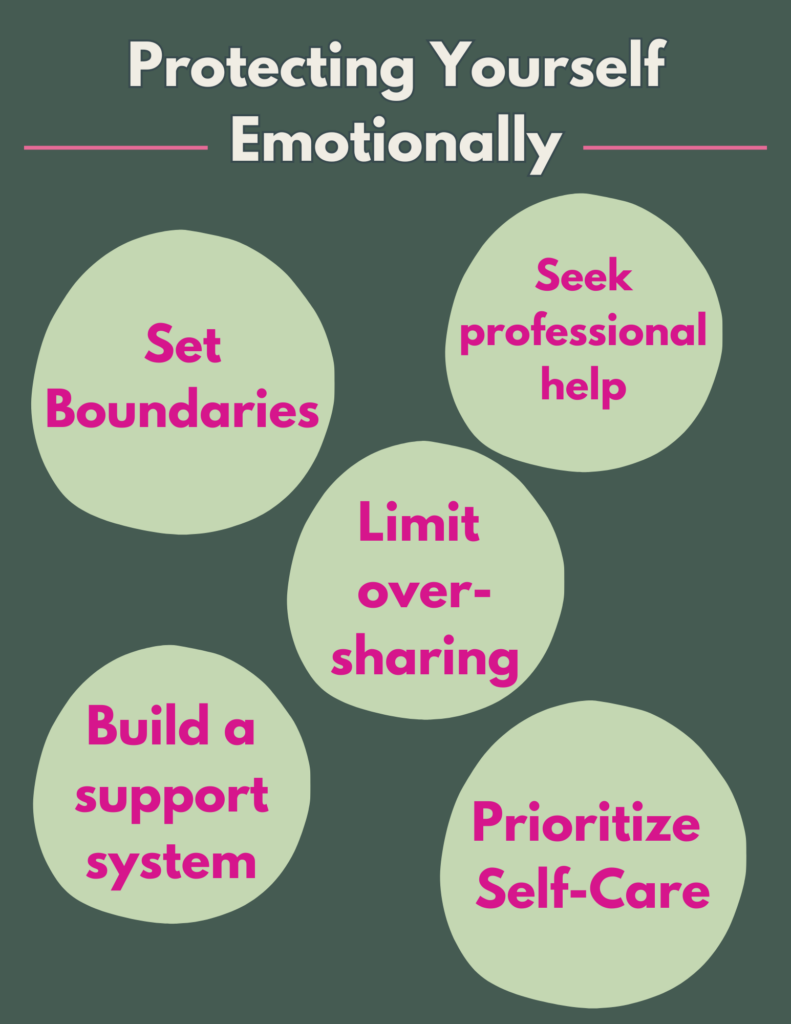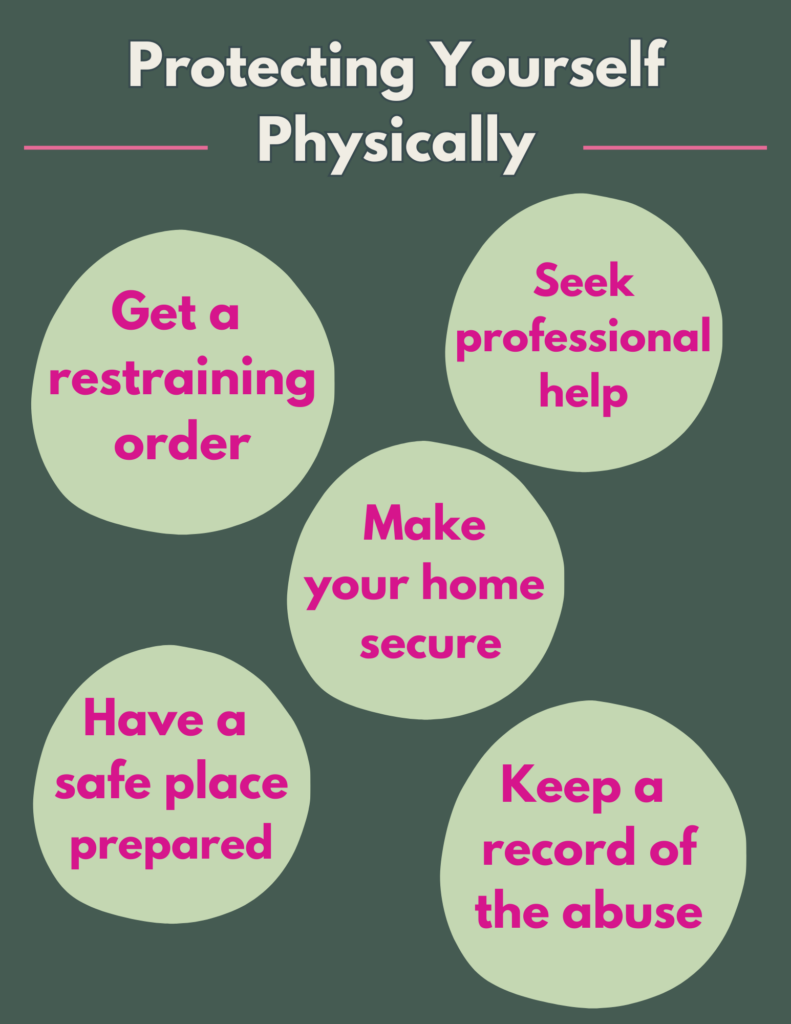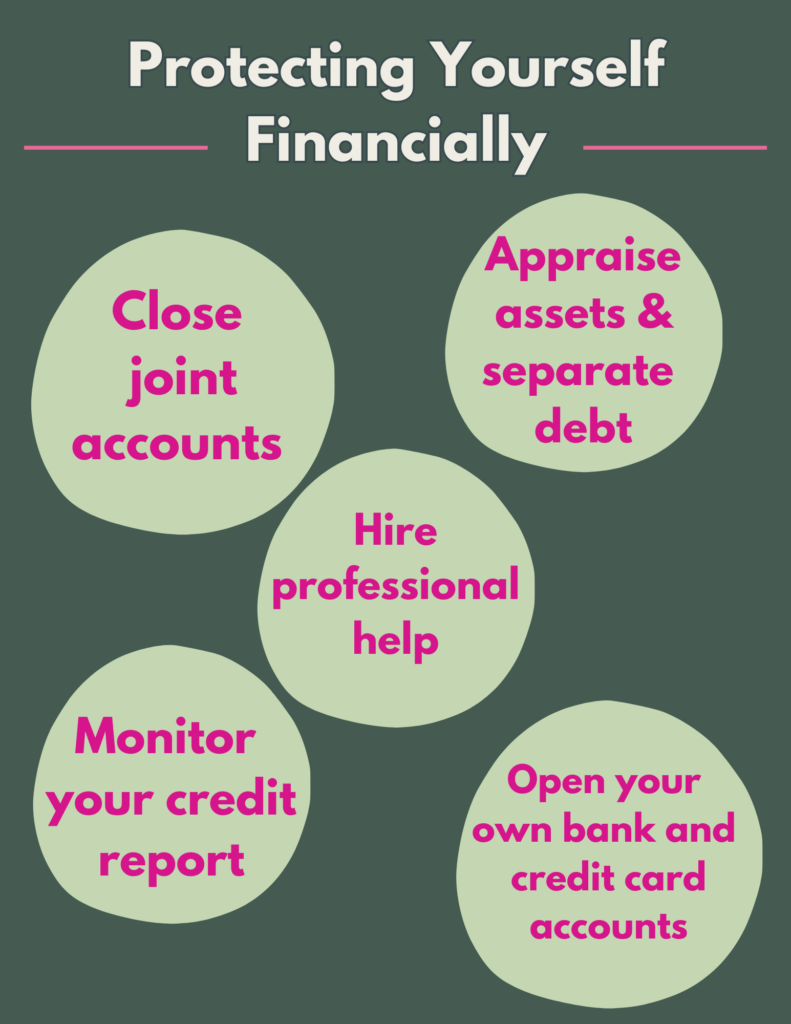“Safety” can mean different things to different people.
For some, it’s about physical protection, while for others, it’s about emotional or financial security. In this article, we’ll explore these 3 key areas of safety and provide an overview, with links to deeper resources for each.
🚨 Before we dive in, if you’re in immediate physical danger, please call 911 or reach out to organizations that can help 👇
- National Domestic Violence Hotline
- Call 800-799-SAFE (7233)
- Text “Start” to 88788
- Find Local Resources
Divorce is one of life’s most stressful experiences.
Taking care of your safety is one of the most important and empowering steps you can take during this process. We know you’re juggling a lot, and life doesn’t pause just because you’re facing something bigger. That’s why we’re here to share key strategies for protecting yourself emotionally, physically, and financially during you.
Protecting yourself emotionally

We’re here to help you prioritize your emotional well-being during this tough time. Here are key strategies to protect yourself emotionally throughout your divorce:
Set Boundaries – Setting boundaries during a divorce means being clear about your needs—whether it’s how you communicate, manage finances, handle custody, or keep emotional space. Stick to those boundaries, stay respectful, and ask for help if needed to avoid conflict.
Prioritize Self-Care – Taking care of yourself is essential, especially during such a challenging time. We get it—it’s tough, and sometimes it feels impossible to carve out time for yourself. But if there’s one thing we can urge, it’s this: prioritize yourself. You can’t be there for anyone else unless you’re taking care of yourself first.
Check out 💡 6 Tips to Stay Calm During Stress 💡 and Divorce is NOT Selfish 💡
Build a Support System – Lean on your people during this time. Reach out to trusted family, friends, or anyone in your circle who has your back and wants the best for you. We all need community, especially when things get tough, so don’t be afraid to lean on those who can help.
Seek Professional Help – There are professionals for everything. In addition to a strong legal team (lawyers, mediators, collaborative lawyers) you may want support with your finances, your heart, your mind, or your kids. We know that, so we’ve got you! Stay on top of our Find A Professional community, and check out some of our highlighted experts below. 👇
Learn more about 💡 Divorce Coaches , Certified Divorce Financial Analysts & Parenting Coaches 💡
Limit Oversharing – It’s 100% normal to want to vent during a divorce, but be mindful of who you talk to and why. Venting to the wrong person can strain relationships, especially with kids. Plus, staying stuck in negativity drains your energy and doesn’t help your mental or emotional health. Focus on conserving your energy for self-care, not spreading it around in toxic circles.
Protecting yourself physically

We’re here to help you prioritize your physical well-being during this tough time. Here are key strategies to protect yourself physically throughout your divorce:
Get a Restraining Order – A restraining order is a legal document that helps protect you by limiting what your partner can do or how close they can get to you. Often called “protection orders.” It’s designed to keep you safe and typically used in cases of domestic violence. Requirements, processes, and rules vary by state. When your safety is at risk, a restraining order can be a powerful step in protecting you.
Seek Professional Help – Therapists, local advocacy orgs, and relationship or divorce coaches are a great source for professional support and guidance in relationships with physical abuse.
Check out 💡 List of State-by-State Resources for Domestic Violence 💡
Make Your Home Secure – If an argument starts or you feel tension rising, stay away from areas with potential weapons, like the kitchen, bathroom, bedroom, or workshop. Lock up any firearms or other weapons in your home. Make sure you know safe exits. If you can, talk to a trusted neighbor—ask them to call 911 if they hear trouble.
Have a Safe Place Prepared – Have a safe place in mind if you need to leave, even if you don’t think it’ll come to that. Could you stay with a family member or friend? Or would a shelter, where you’d be supported by people experienced in these situations, feel safer?
Check out 💡 Escape Abuse & Find a Safe Space 💡 for more in-depth info
Keep a Record of the Abuse – Keeping a record of abusive incidents can help you recognize warning signs, take steps for your safety, and be prepared if you choose to seek legal help. Here’s a few suggestions on how to document abuse:
- Write down each incident, including how it made you feel.
- Note statements made by you, your partner, or any witnesses.
- Record dates, times, and details of what happened.
- Take photos of any damage to your surroundings (like overturned furniture).
- Document any injuries with photos if possible, even minor ones.
- Get medical attention, especially if you were choked, even if injuries aren’t visible
Check out 💡 Documenting Abuse💡 for more in-depth info.
Protecting yourself financially

We’re here to help you prioritize your financial well-being during this tough time. Here are key strategies to protect yourself financially throughout your divorce:
Close Joint Accounts – To close joint accounts during a divorce, start by contacting your bank to understand their process. If you and your spouse agree, the bank will be able to divide and close the account. If you can’t agree, consult a lawyer or expert to help.
Appraise Assets & Separate Debts – Get a clear picture of your finances—explore every detail. Know your assets and get them valued, list out all debts (shared and personal), and start thinking about how you’d want to divide them. Taking action now is way better than avoiding it.
Hire Professional Help – Work with a finance pro to safeguard your assets, keep an eye on debts, and help you plan for your future.
Get started here & learn about💡 Certified Divorce Financial Analysts 💡
Monitor Your Credit Report – Managing your credit might not be the first thing on your mind when you’re going through a divorce, but maybe it should be. Solid credit is critical to your long-term financial health.
Get the full scoop💡7 Key Steps for Protecting Your Credit Through Divorce 💡
Open Your Own Accounts – If you haven’t already, open your own bank and credit card accounts. Not sure how? → Start by researching banks online or visiting a local branch and explaining what you need. Having your own accounts is a crucial and empowering step to take.
